Ever notice how you instantly dismiss a fact that contradicts what you already believe? Or how you blame traffic for your late arrival but call your coworker lazy when they’re late? That’s not just bad luck-it’s your brain on autopilot. Cognitive biases are the invisible filters that twist how you see the world, and they’re the reason your responses to everyday situations are rarely as neutral or logical as you think.
Why Your Brain Loves Quick Answers
Your brain didn’t evolve to be fair. It evolved to be fast. Back when humans were dodging predators and hunting for food, slow thinking meant death. So your brain developed shortcuts-mental rules of thumb called heuristics-to make snap judgments. These worked well in the wild. Today, they’re messing with your job, your relationships, and even your health.Take confirmation bias. It’s the most powerful of all. When you hear something that matches your belief, your brain lights up like a Christmas tree. When you hear the opposite? Your brain shuts it down. A 2020 study in Nature Neuroscience showed that when people encounter information that challenges their views, the part of their brain responsible for logic (the dorsolateral prefrontal cortex) actually gets quieter. Meanwhile, the area tied to emotion and self-identity (the ventromedial prefrontal cortex) goes into overdrive. You’re not being stubborn-you’re biologically wired to protect your worldview.
How Beliefs Turn Into Automatic Responses
Beliefs aren’t just opinions. They’re mental habits. And once they’re set, your brain treats them like facts-even when they’re wrong.Consider the false consensus effect. You think your political view, your parenting style, or your opinion on coffee is normal. It’s not. Studies show people overestimate how much others agree with them by more than 30 percentage points. Why? Because your brain assumes everyone thinks like you. It’s easier that way. So when someone disagrees, you don’t just think they’re wrong-you think they’re weird, irrational, or even malicious.
This isn’t just social. It’s dangerous in high-stakes situations. In healthcare, doctors with strong confirmation bias miss diagnoses 12-15% more often. If a doctor believes a patient has a migraine, they’ll overlook signs of a brain bleed-even if the symptoms don’t fully match. In courtrooms, jurors who believe someone is guilty will interpret ambiguous evidence as proof. Eyewitness misidentifications, heavily influenced by expectation bias, caused 69% of wrongful convictions later overturned by DNA evidence.
The Hidden Cost of Self-Serving Bias
You’re probably the exception. You’re not biased. But you’re wrong.Self-serving bias is the silent killer of accountability. When you ace a presentation, it’s because you’re brilliant. When you bomb it? The Wi-Fi failed. The client was unreasonable. The meeting was scheduled at the worst time. A 2023 Harvard Business Review study found managers who used this bias 82% of the time for failures had 35% higher team turnover. Why? Because employees stop trusting leaders who never take blame.
And here’s the twist: you think you’re fair. In fact, 86% of people believe they’re less biased than others. That’s called the bias blind spot. You can spot bias in your boss, your partner, your politician-but never in yourself. It’s like wearing tinted glasses and thinking everyone else sees the world differently.
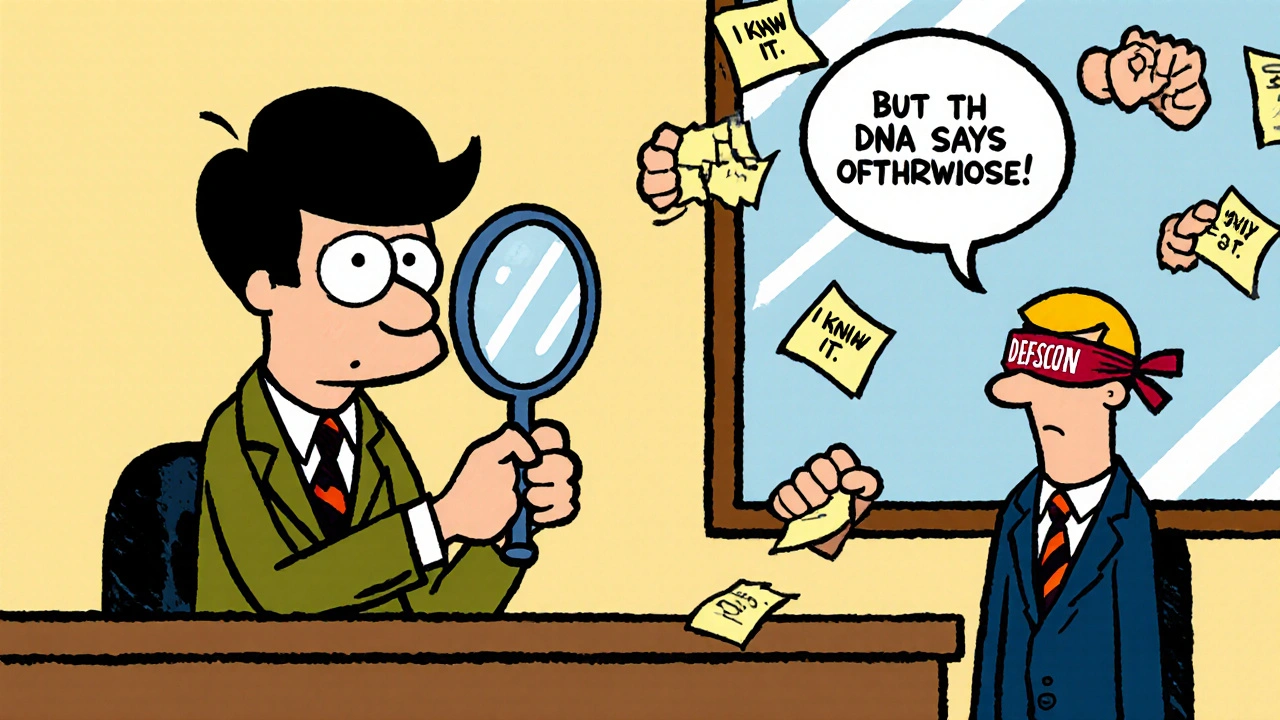
Why Group Loyalty Warps Your Judgment
You don’t just favor your own beliefs-you favor your own group. Whether it’s your team, your political party, your favorite sports team, or your family, you judge people inside your circle more kindly than those outside.That’s in-group/out-group bias. A 2023 study found people react 38% more emotionally to actions by outsiders than insiders. A coworker from another department misses a deadline? They’re lazy. Your teammate? They’re overwhelmed. A stranger cuts you off in traffic? Rude. Your sibling? Just having a bad day.
This bias doesn’t just create tension. It fuels division. In conflict zones, it turns neighbors into enemies. In workplaces, it kills collaboration. In politics, it makes compromise impossible. And it happens without you realizing it. Your brain doesn’t need a reason to favor your group. It just does.
How Hindsight Makes You Feel Like a Psychic
After something happens, you swear you saw it coming. “I knew they’d fire him.” “I told you the stock would crash.” But you didn’t. Not really.Hindsight bias makes you believe the past was more predictable than it was. In a classic 1993 study, students were asked to predict the outcome of Clarence Thomas’s Supreme Court confirmation. After the vote, 57% claimed they’d been sure of the result-even though most had been uncertain before. This isn’t just harmless bragging. It’s dangerous. In business, leaders who fall for this think they’re geniuses when they get lucky. They repeat risky moves, ignoring the role of chance. In medicine, doctors who think they “knew” the diagnosis all along skip checking alternatives. That’s how errors become routine.
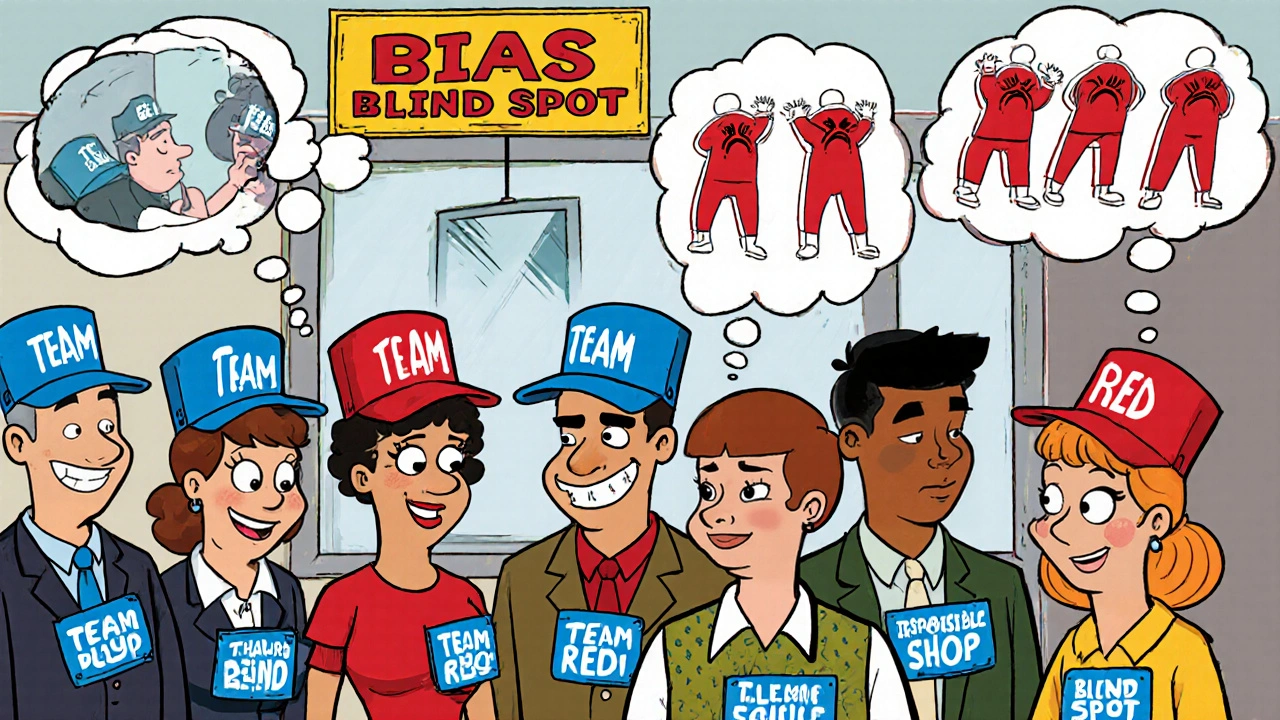
What You Can Actually Do About It
You can’t turn off your brain’s shortcuts. But you can train it to pause.One simple trick: consider the opposite. Before you make a decision, ask: “What if I’m wrong? What evidence would prove me wrong?” University of Chicago researchers found this cuts confirmation bias by nearly 40%. It’s not about being negative. It’s about being accurate.
Another tool: slow down. When you feel strong emotion-anger, pride, fear-pause for 10 seconds. That’s enough time for your analytical brain to catch up with your emotional one. Medical schools now teach this. Students who practice it reduce diagnostic errors by almost 30%.
Organizations are catching on too. The FDA approved the first digital therapy for cognitive bias in 2024. The EU now requires AI systems to be checked for bias. Google’s Bias Scanner analyzes billions of search queries monthly to flag belief-driven language. These aren’t futuristic ideas. They’re real, tested tools.
Why This Matters More Than Ever
We live in a world flooded with information. Algorithms feed you what you already believe. Social media rewards outrage. Politicians exploit your biases. If you don’t recognize how your brain is being manipulated, you’ll keep reacting-not thinking.The cost? Billions in lost productivity. Thousands of preventable medical errors. Millions of broken relationships. The World Economic Forum ranks cognitive bias as the 7th biggest global risk-bigger than climate misinformation or cyberattacks. Why? Because bias doesn’t break systems. It quietly distorts them from the inside.
You don’t need to be a psychologist to fight bias. You just need to notice when you’re on autopilot. When you feel certain, ask: “Is this true-or just comfortable?” When you judge someone, ask: “Would I say this if it were me?” When you’re proud of a win, ask: “How much of this was me-and how much was luck?”
That’s not weakness. That’s wisdom.
What are the most common cognitive biases that affect everyday decisions?
The top five are confirmation bias (favoring info that matches your beliefs), self-serving bias (taking credit for success but blaming others for failure), in-group/out-group bias (favoring people like you), hindsight bias (thinking you predicted the outcome), and the false consensus effect (believing everyone agrees with you). These show up in work, relationships, health choices, and politics-often without you noticing.
Can cognitive biases be corrected, or are they permanent?
They’re not permanent, but they’re not easy to fix either. You can’t erase them, but you can reduce their power. Techniques like ‘consider the opposite,’ slowing down before reacting, and using checklists in decision-making have been proven to cut bias effects by 30-40%. Real change takes 6-8 weeks of consistent practice. Apps and training programs help, but only if used regularly.
Why do people think they’re less biased than others?
It’s called the bias blind spot. A Princeton University study found 86% of people believe they’re less biased than their peers. This happens because we can see bias in others’ actions but not in our own. We know our intentions, so we excuse our mistakes. But we only see others’ behavior, so we judge them harshly. It’s a blind spot built into human psychology.
How do cognitive biases affect healthcare?
In healthcare, confirmation bias leads to missed diagnoses-doctors focus on what fits their first guess and ignore contradictory symptoms. One study found this contributes to 12-15% of medical errors. Hindsight bias makes doctors think they ‘knew’ the diagnosis all along, so they skip double-checking. And anchoring bias causes them to fixate on the first piece of information, even if it’s wrong. Hospitals that use structured diagnostic checklists reduce these errors by nearly 30%.
Are cognitive biases the same across cultures?
Some are, some aren’t. Confirmation bias and hindsight bias appear everywhere. But self-serving bias is stronger in individualistic cultures like the U.S. and Australia, where personal achievement is emphasized. In collectivist cultures like Japan or South Korea, people are more likely to blame external factors for success and take personal responsibility for failure. In-group bias also varies-stronger in societies with deep social hierarchies.
What’s the difference between a cognitive bias and a stereotype?
A stereotype is a fixed belief about a group of people-like ‘all teenagers are reckless.’ A cognitive bias is a mental shortcut that distorts how you process information. Stereotypes are often the content of bias; cognitive bias is the mechanism. For example, in-group bias uses stereotypes to judge outsiders more harshly. But you can have bias without stereotypes-like believing you’re better at driving than others, even if you don’t think about gender or age.
Can technology help reduce cognitive biases?
Yes. Tools like IBM’s Watson OpenScale monitor AI decisions for biased patterns and flag them in real time. Google’s Bias Scanner analyzes search results and language for belief-driven language. The FDA approved a digital therapy in 2024 that trains users to recognize and override biased thinking. These tools don’t replace human judgment-they support it. But they only work if people actually use them.
Why do people resist learning about cognitive biases?
Because admitting you’re biased feels like admitting you’re flawed. Many people think bias means stupidity or ignorance. But it’s not. It’s normal. It’s human. The resistance isn’t about knowledge-it’s about identity. When you learn about bias, you’re forced to question your own judgments. That’s uncomfortable. The most effective training doesn’t shame-it normalizes. It says: ‘Everyone does this. Here’s how to get better.’
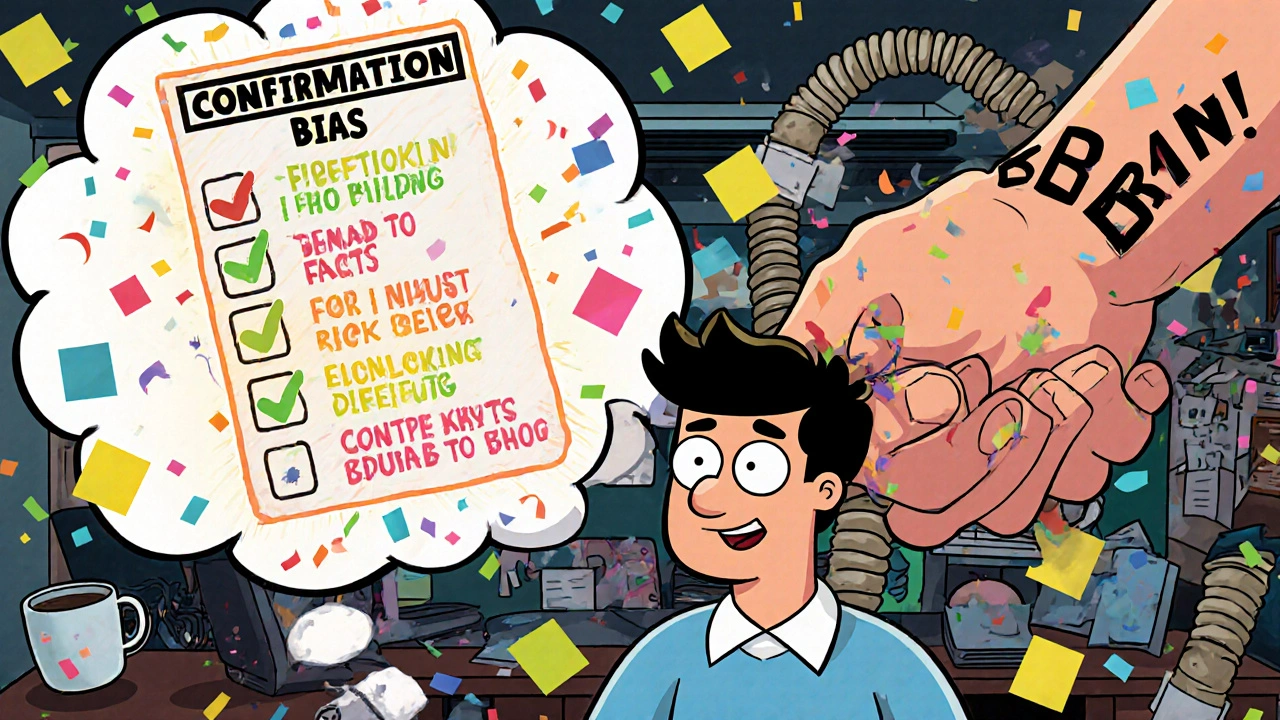
 Transform Your Health with Gossypol – The Game-Changing Supplement
Transform Your Health with Gossypol – The Game-Changing Supplement
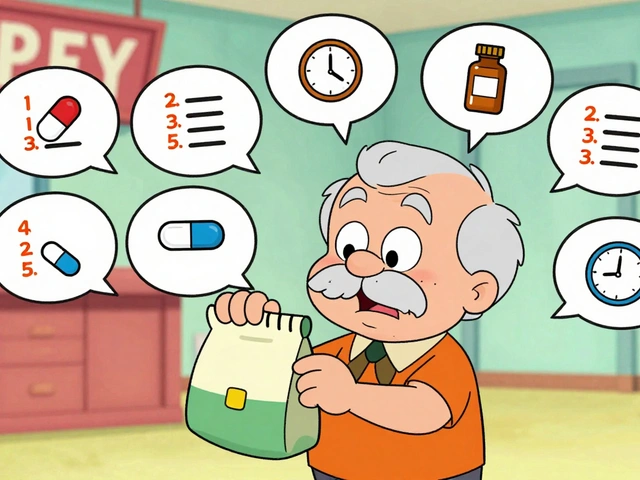 How to Audit Your Medication Bag Before Leaving the Pharmacy: A Simple 7-Step Safety Check
How to Audit Your Medication Bag Before Leaving the Pharmacy: A Simple 7-Step Safety Check
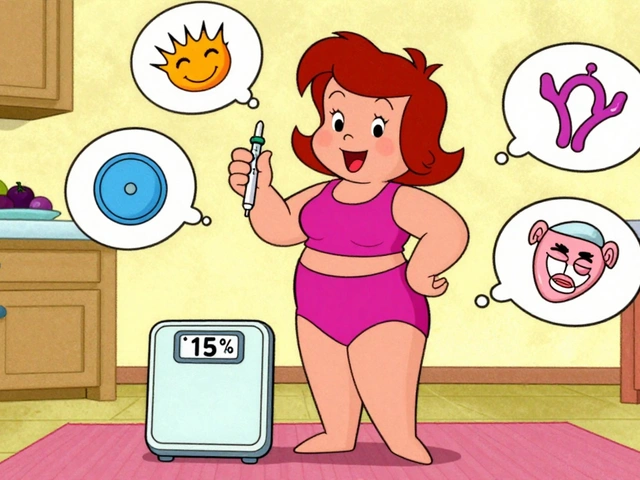 GLP-1s for PCOS and Obesity: Real Weight Loss and Metabolic Benefits
GLP-1s for PCOS and Obesity: Real Weight Loss and Metabolic Benefits
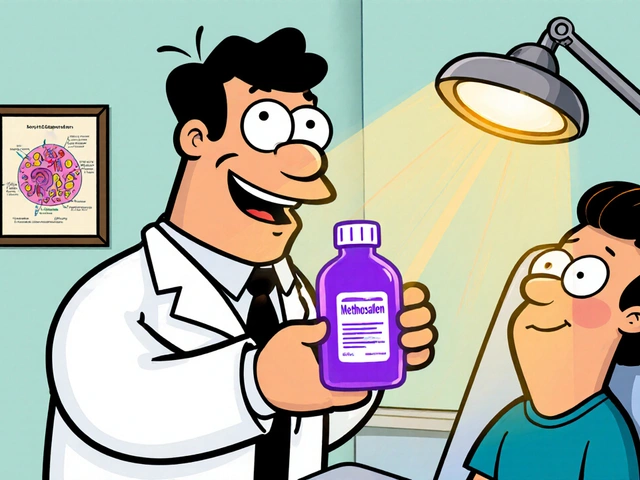 Methoxsalen and Collagen Production: What It Does to Your Skin
Methoxsalen and Collagen Production: What It Does to Your Skin
 Prophylaxis for Orthodontic Patients: Keeping Your Braces Clean and Effective
Prophylaxis for Orthodontic Patients: Keeping Your Braces Clean and Effective
Latrisha M.
November 15, 2025 AT 17:13Just wanted to say this post nailed it. I’ve started using the ‘consider the opposite’ trick at work-and it’s wild how often I catch myself jumping to conclusions. Took me two weeks, but now I pause before replying to emails. Small change, huge difference.
Danish dan iwan Adventure
November 17, 2025 AT 01:57Confirmation bias is a cognitive architecture failure, not a personal flaw. It’s neuroevolutionary optimization misaligned with post-industrial information density. Your brain isn’t broken-it’s operating on legacy heuristics in a high-dimensional signal environment.
John Mwalwala
November 17, 2025 AT 17:08Bro this is so real. I’ve been using AI bias scanners at my job and honestly? They catch way more than humans. Google’s tool flagged my team’s recruitment language as ‘implicit meritocracy bias’-turns out we were unconsciously favoring Ivy League grads. Eye-opening. Tech isn’t the enemy-it’s the mirror.
Deepak Mishra
November 19, 2025 AT 01:30OMG YES!!! I just realized I’ve been doing the false consensus thing with my yoga group-thought everyone hated pineapple on pizza but turns out 7/10 loved it??? 😭 I’m so embarrassed!! I need to slow down and not assume everyone thinks like me!!!
Jamie Watts
November 20, 2025 AT 11:24You people are overthinking this. Everyone knows you’re biased. That’s why you need to stop pretending you’re special. The only cure is accountability. If you mess up, own it. If you win, thank luck. Simple. Done. No apps needed.
Rachel Wusowicz
November 22, 2025 AT 00:13...I’ve been watching the news since 2016... and I swear... the algorithms are *feeding* us this... they’re *engineering* our biases... I mean... have you seen how the same headlines get reshaped for different demographics? It’s not coincidence... it’s *orchestrated*... the government, the tech giants, the banks-they all use this... they know exactly how to trigger your amygdala... and you? You’re just... clicking... believing... reacting... like a lab rat with a dopamine drip...
...I once Googled ‘why do I hate my boss’... and the next day... my feed was full of ‘toxic workplaces’... and ‘corporate mind control’... I didn’t even search for that... it just... appeared... like it *knew*...
...I think they’re using this to keep us divided... because if we all realized how manipulated we are... we’d rise up... and they can’t have that... they need us to blame each other... not them...
...I’ve started using a VPN... and disabling cookies... and reading *only* primary sources... and I swear... the noise has dropped... like 80%... I feel... clearer... but also... lonelier...
...is anyone else seeing this...?
Oyejobi Olufemi
November 23, 2025 AT 17:59Let me tell you something you won’t hear from the elite psychologists-they’re not talking about the *real* bias. It’s not confirmation, it’s not hindsight-it’s *identity bias*. You don’t believe what you believe because of logic-you believe it because it defines who you are. Your politics? Your religion? Your favorite team? They’re not opinions-they’re tattoos on your soul. And you’d rather die than erase one. That’s why no amount of data changes you. Because you’re not trying to be right-you’re trying to be *you*. And that’s the real tragedy.
Ankit Right-hand for this but 2 qty HK 21
November 25, 2025 AT 06:31India has zero cognitive bias because we’ve been surviving chaos for 5000 years. You Westerners think you’re smart because you have apps and checklists? We had grandmothers who knew if a man was lying by the way he held his tea cup. Your bias is your privilege. Ours is survival.
Daniel Stewart
November 25, 2025 AT 15:17There’s an existential irony here: the very act of recognizing bias requires a meta-cognitive capacity that itself may be biased. If I believe I’ve overcome bias, am I not falling into the bias blind spot? And if I doubt that I’ve overcome it, am I not reinforcing it? The pursuit of objectivity may be the most subjective act of all. Perhaps the only honest stance is radical humility.